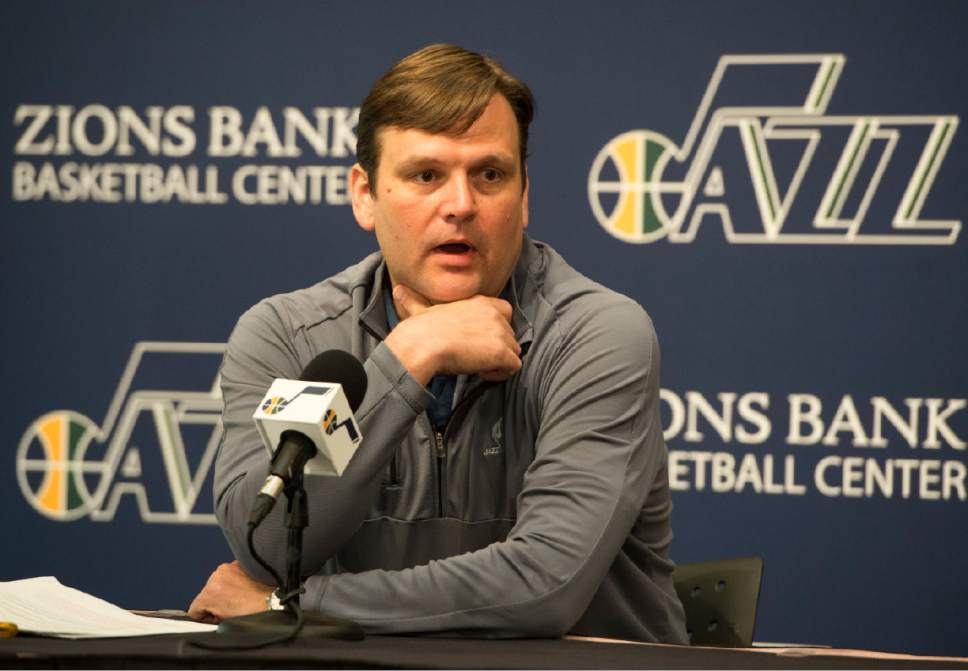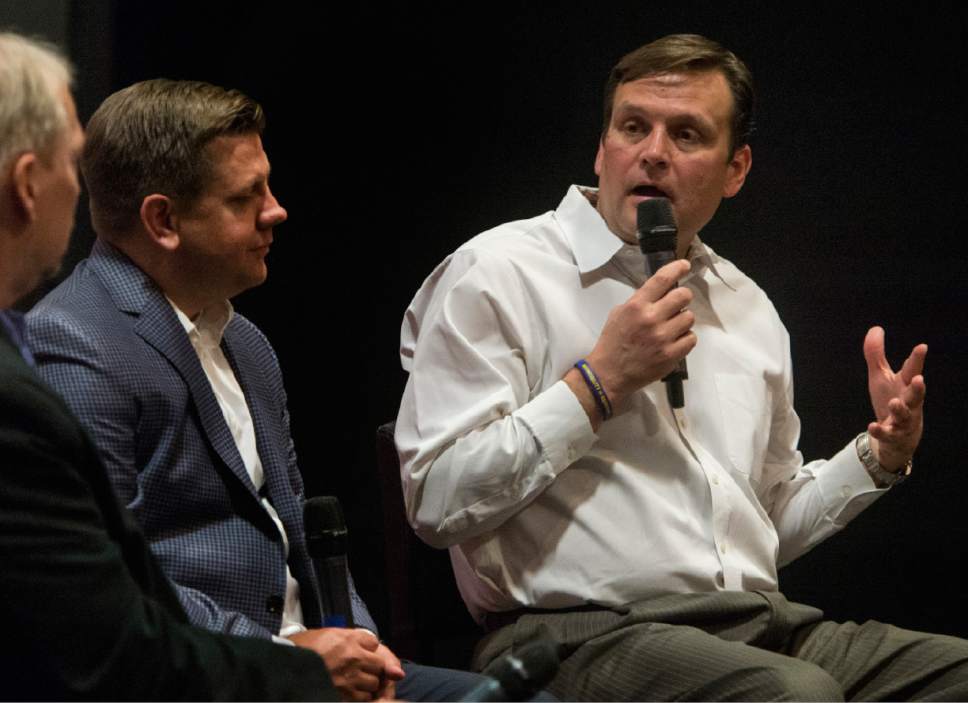This is an archived article that was published on sltrib.com in 2017, and information in the article may be outdated. It is provided only for personal research purposes and may not be reprinted.
Dennis Lindsey asked everybody to go ahead and fire away.
They were assembled there and he was sitting in front of them on a postseason panel, not just facing the music, rather asking the volume to be cranked to whatever blast level was most satisfying, most useful, maybe even most hurtful, straight into his bleeding ears. He knew one year ago at this time his reconstruction project had fallen short, broken down and disappointed. The Jazz had been bumped and bruised and busted, facing injuries and adversity, winning 40 games — and being embarrassed by Kobe Bryant and the Lakers in their final game — and landing a few levels beneath what he and everyone on his staff had aimed for at the end of the 2015-16 season: the playoffs.
Vivint Smart Home Arena instead was dark, and the lockers at the Jazz practice facility were getting cleaned out by the players, leaving him to explain not just what had happened, but what he was planning to do about it, where the Jazz would go from there.
This is part of what he said: "We're not going to sit here and alibi. Every professional sports team has injuries and, ultimately, I'm most responsible up here on the dais, not Quin [Snyder], not the coaches, not the players, relative to roster construction. Some of the criticism that's out there has been fair relative to maybe our payroll being low, our team being young, us not addressing a couple of issues at the trade deadline, and so I welcome all those questions. I'm eager to jump into analysis. It's a little quick to digest. But we'll do as good a job as possible answering those questions as best we can."
He answered the questions that day from others and he answered them later to himself.
Lindsey went out and signed Joe Johnson, traded for George Hill and Boris Diaw and counted on Snyder to blend them into an existing team that could share minutes and playing style and the ball and the glory and who would function together.
When much of the same adversity struck the Jazz again in 2016-17, they were more prepared this time, and they won 11 more games, plus three, so far, in the playoffs.
Snyder said a couple of days ago that those players — from emerging stars Rudy Gobert and Gordon Hayward to the upwardly mobile rank-and-file Rodney Hood, Joe Ingles, Raul Neto and Dante Exum to vets Hill, Johnson and Diaw, among others — mixed together, loving to play basketball, loving to play it together.
And now the Jazz are in those playoffs, doing battle, trying to eliminate the L.A. Clippers in the Western Conference's first round.
It's impossible or irresponsible, then, to witness the progression of the Jazz, who are still a ways from authentic contention, without reflecting back on that day a year ago when Lindsey confessed his shortcomings, said he would analyze them and fix them. While they only partially may be repaired or built at this point — Lindsey's stated goal is an NBA title — the advancement in such a short period is commendable.
He said what he said and he did what he did. His team now is doing what it's doing, plain to see. That doesn't always happen in professional sports. In fact, it's rare.
Many general managers leading underwhelming teams in all kinds of sports hunker down, run for shelter, devise their plans and later watch them fail. And then they either leave it be, moving deliberately or they start over again, getting desperate. When they do make public pronouncements, their noses often blow through the nearest window in a Pinocchio effect.
Lindsey did the opposite. He told the truth, examined the truth, and delivered the truth.
It's not perfect and there's a long road ahead, something he'll admit when the Jazz's current run ends, whenever that comes. If they get by the Clips, they'll face the best basketball team on the planet. You Know Who led by You Know Who.
But for one season's work, Lindsey's honesty and acumen look pretty darn sharp, pretty darn on point. Anybody who's been around the NBA knows how difficult that is to pull off so quickly, particularly without making a supposed blockbuster deal or drafting a generational player.
Instead, Lindsey looked at what he already had, hauled in what he could, and turned the whole thing over to a coach who, in spite of some bad fortune, transformed the Jazz into a worthy playoff team, a team others respect and, in some cases, fear.
Turns out, honesty really is the best policy — if you're smart enough to make it that way.
GORDON MONSON hosts "The Big Show" with Spence Checketts weekdays from 3-7 p.m. on 97.5 FM and 1280 AM. Twitter: @GordonMonson.





